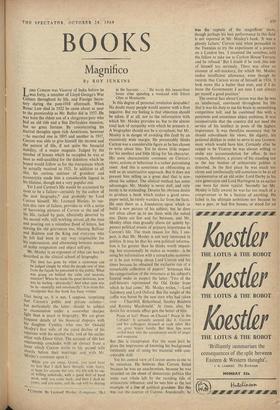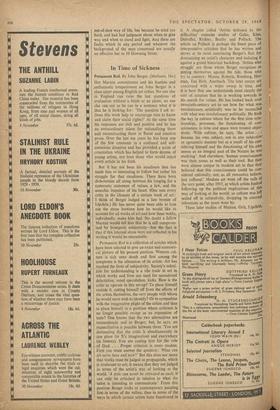KINGSLEY AMIS
Out of Hiding
Trumpets from the Steep. By Diana Cooper. (Hart-Davis, 25s.)
THE Third, final volume of Lady Diana's memoirs covers the last war. Her husband's resignation over Chamberlain's truckling to Hitler put him out of a job, so he' spent the phoney war lectur- ing in the States. With Churchill in, Duff Cooper became successively Minister of Information, a roving Minister in charge of the Eastern war, and Ambassador to France. Reading the first volume thought incredulously that this was the same First World War that my father fought in and talked of so bitterly : the difference in atmosphere was that between Rupert Brooke and Wilfred Owen. The second made me reflect on the impli- cations of the fact that while I had never met anyone for whom the Twenties and Thirties were not the arena for the contest between Fascism
ISMAY
LORD ISMAY'S MEMOIRS
"... a remarkably clear and connected picture, seen from a position of unique observation, of the events leading up to the outbreak of the war and its progress to eventual victory and aftermath." Field Marshal Lord Slim , 42/- 1111111111111111111111111111111111111111111111111111IIIIIIII111111111111111111111111
BOSWELL
For the Defence
"scrupulously edited and annotated, and beautifully produced." Times Literary Supplement "By far the most interesting of the products of the Yale Boswell factory since Boswell's London Journal" David Daiches, Time and Tide
Illustrated 21/- 11111111111111111111111111111111111111110111111111111111111111111111111111111111111
REVOLT
HEINEMAPiN
i*.LOMPZNI4IPMCVMP14.111111P1114W11
IN PARADISE
K'Tut Tantrsi's adventure in exotic Bali. "The story of just how dangerous one brave, dogged woman can be, even to armies and govern-
ments." Evening Standard 21/- She can be perfunctory, out of an admitted impatience with the task, or dip her pen into that purple ink used by Winston Churchill at his worst. 'Black doom was retreating and the Powers of Light ever on the march, scattering the enemy before them,' was written by a rhetorical Anon, a very different person from that who scribbled: `Duff's fiftieth birthday. He never groans at the passage of time. I can't think why.' Or: 'I saw the Pope carried shoulder high through two throngs of Allied soldiers, blackamoors, Poles and ordinaries, and he touched 1 per cent. of the rosaries held up to him.' Or, 'No sign of the war in Paris, no delays or substitutes. Heavy, meaty and buttery meals in 'abundance. The Government fell with a thud as we arrived.' These bits, and all the good things, are from letters. Her friend Conrad said back in volume two, startled out of his usual restraint into exclama- tion by a particularly brilliant piece of intimate reportage : 'You are a great letter writer, Diana!' He was right. One feels he always was. His per- sonality, dry, tender, civilised, warmed the second volume and it lights up this one. When he died at the end of the war, and she added his name, with her particular brand of painful fortitude, to the roll-call of her dead that she makes more and more often, the book seems to reach its natural end. It occurs to me, not for the first time, that the generation which grew up to expect that people weren't going to be killed were alto- gether healthier than our lot. There is always a note of shocked surprise behind the elegiac tolling of Diana Cooper's bell; but I don't think we are shocked or surprised; death is built into our nerves.
Perhaps, too, that fabulous childhood accounted for the zestful enjoyment which was always her gift and still shows in this volume, whenever lulls in official responsibility gave her a chance to live as she wanted, in her country cottage, farming under the tutelage of Conrad Russell. This happiness ended when she became ambassadress. She exclaims, histrionically, for the reader, 'Are my alarums and excursions never to end?'; but writes privately : 'I lie awake with galloping out-of-hand thoughts, some niggling ones about ash-trays, others about British prestige
and Duff's dignity.' This when she was coping, exuberantly, with chaos and squalor in Algiers. She is .a great coper; enjoys difficulties and the unorthodox; hates protocol and red-tape; and the buoyant note of her description of life in Algiers changes to one of strain when she describes life in the properly appointed Paris Embassy. It is on a strained note the memoir ends, because she chooses a formal, over-literary style for the farewell, which can't express the tough, stoical person she has become.
DORIS LESSING
Beloved Backwardness
WHILE we never cease to worry about 'backward' peoples we are never so 'well pleased as when we hear of a tribe or country that has eluded our passion for reform and remained uncompromis- ingly primitive. So no doubt others will get as much pleasure as I did from Guy Piazzini's The Children of Lilith (Hodder and Stoughton, 21s., suavely translated by Peter Green), which records a visit to the very ends of time. Piazzini and his friends set out to examine the head-hunting Dyaks of interior Borneo and also, if they could find them, the even more elementary Punan- these latter being nomadic forest hunters whose pattern of life would have been thought unpro- gressive in the Stone Age. On the way to Borneo the expedition called at some small islands off the Flores where, by way of aperitif, they could observe the antics of the `dragons'—giant lizards ten feet in length, carnivorous, cantankerous and cowardly, thought to have survived from the Jurassic Era. My only complaint about this book is that the giant lizards prove so fascinating under Piazzini's investigation that the head-hunters















































 Previous page
Previous page